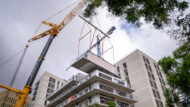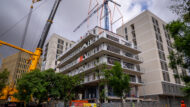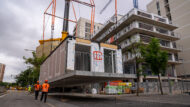A block of 40 publicly owned homes for young people and single-parent families is being built in Av. Carrilet, in the Bordeta neighbourhood. The block should be constructed in just ten days by assembling 48 factory-produced modules, a system that can almost halve the building time compared to conventional construction methods. Once the assembly is completed, utilities will be installed and the façades, rooftops and balconies finished.
The flats are distributed between the second and ninth floor, while the basement, the ground floor and the first floor will be used for communal spaces and a municipal facility. Each floor of housing will have five flats and residents will have access to communal services such as a dining room with a kitchen, laundry room, multi-purpose rooms and a communal terrace. The work is expected to conclude at the end of 2026 and the overall investment is over 6.7 million euros.
The modules are made with an assembly chain in parallel to the work at the site, enabling for processes to overlap and time frames to be cut. When they get to the site the modules already have a bathroom, kitchen, windows and installations, facilitating swift and secure assembly. Manufacturing in controlled environments at ground level also helps reduce labour risks, generates less waste and emissions and minimises reliance on weather conditions.
This project brings the total number of homes built with industrialised methods to 421, shared between nine developments. Of these, 207 have already been handed over, 54 are temporary APROP homes, 51 will be handed over soon and 109 are at different stages of execution. This type of construction, widely used in northern Europe, is becoming consolidated as way of increasing the protected housing stock in the city efficiently, safely and sustainably.






